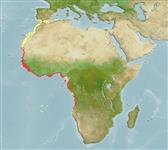Teleostei (teleosts) >
Eupercaria/misc (Various families in series Eupercaria) >
Sparidae (Porgies)
Etymology: Pagellus: Diminutive of Latin, pager, derived from Greek, pagros = a fish, Dentex sp. (Ref. 45335).
More on author: Steindachner.
Environment: milieu / climate zone / depth range / distribution range
Ecology
Marine; demersal; depth range 100 - 250 m (Ref. 27000), usually 10 - 50 m (Ref. 5377). Subtropical; 37°N - 17°S, 19°W - 14°E
Eastern Atlantic: Strait of Gibraltar to Angola, including the southwestern Mediterranean (Ref. 3469) and the Canary Islands.
Length at first maturity / Size / Weight / Age
Maturity: Lm 12.2 range ? - ? cm
Max length : 42.0 cm SL male/unsexed; (Ref. 4781); common length : 25.0 cm SL male/unsexed; (Ref. 4781)
Occurs in schools over hard as well as sandy bottoms, especially in the upper 100 m. Omnivorous with a predominantly carnivorous diet (including crustaceans, cephalopods, small fish, amphioxus and worms). Protogynic hermaphrodite (Ref. 3688). Minimum depth reported taken from Ref. 127989.
Intermittent spawning occurs from the second year onwards between May and November according to the latitude, the stock moving toward the coast for this purpose.
Bauchot, M.-L. and J.-C. Hureau, 1990. Sparidae. p. 790-812. In J.C. Quero, J.C. Hureau, C. Karrer, A. Post and L. Saldanha (eds.) Check-list of the fishes of the eastern tropical Atlantic (CLOFETA). JNICT, Lisbon; SEI, Paris; and UNESCO, Paris. Vol. 2. (Ref. 3688)
IUCN Red List Status (Ref. 130435)
Threat to humans
Harmless
Human uses
Fisheries: commercial
More information
ReferencesAquacultureAquaculture profileStrainsGeneticsElectrophoresesHeritabilityDiseasesProcessingNutrientsMass conversion
Tools
Special reports
Download XML
Internet sources
Estimates based on models
Preferred temperature (Ref.
123201): 18.5 - 28, mean 25.2 °C (based on 140 cells).
Phylogenetic diversity index (Ref.
82804): PD
50 = 0.5156 [Uniqueness, from 0.5 = low to 2.0 = high].
Bayesian length-weight: a=0.01202 (0.00993 - 0.01455), b=3.04 (3.01 - 3.07), in cm total length, based on LWR estimates for this species (Ref.
93245).
Trophic level (Ref.
69278): 4.0 ±0.51 se; based on food items.
Resilience (Ref.
120179): Medium, minimum population doubling time 1.4 - 4.4 years (K=0.18-0.53; tm=1; tmax=7; Fec=60,200).
Prior r = 0.82, 95% CL = 0.54 - 1.23, Based on 2 stock assessments.
Fishing Vulnerability (Ref.
59153): Moderate to high vulnerability (49 of 100).
Climate Vulnerability (Ref.
125649): Low to moderate vulnerability (26 of 100).
Nutrients (Ref.
124155): Calcium = 164 [78, 347] mg/100g; Iron = 0.706 [0.391, 1.313] mg/100g; Protein = 20.2 [19.0, 21.5] %; Omega3 = 0.414 [0.235, 0.701] g/100g; Selenium = 69.8 [27.3, 173.0] μg/100g; VitaminA = 7.84 [1.97, 34.79] μg/100g; Zinc = 0.462 [0.311, 0.735] mg/100g (wet weight);
